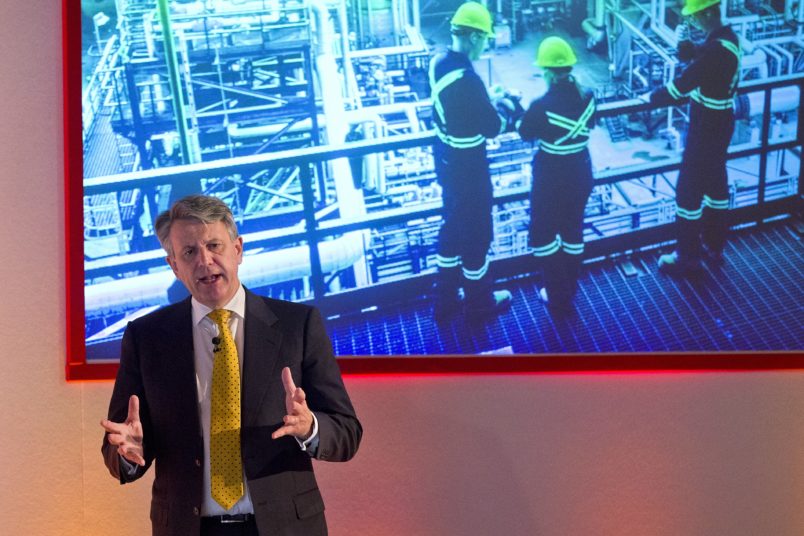This article is part of TPM Cafe, TPM’s home for opinion and news analysis.
From news reports, it might sound like the fossil fuel industry is on the defensive after a landmark court ruling and two shareholder votes challenging the industry’s resistance to curbing its greenhouse gas emissions.
But how much power do decisions like these really carry when it comes to pressuring the industry to change? As an academic who studies climate finance and is familiar with climate litigation, I think there’s something else at work here.
Pressure from the courts
This latest flurry of speculation about the future of the industry began on May 26, 2021, when a Dutch court ordered Royal Dutch Shell to cut its emissions 45% by 2030 from 2019 levels. That includes emissions from vehicles that burn Shell’s gasoline, something for which the oil industry has never been held legally liable.
Digging deeper into the court’s decision, it is clear that the judges paid attention to science. The court agreed that greenhouse gas emissions pose a significant risk to the climate and that only so much more carbon can be released globally if the world hopes to avoid warming the planet by more than 1.5 degrees Celsius over preindustrial levels – the limit agreed to globally under the Paris climate accord. The court held Shell partly responsible for this increase.
The decision appears to hinge on a violation of the Dutch Civil Code’s “unwritten standard of care,” which, according to the court, means that “acting in conflict with what is generally accepted according to unwritten law is unlawful.” Shell “must observe the due care exercised in society,” the court wrote.

Shell plans to appeal the ruling in the Dutch court, and that doubtlessly will involve a protracted debate on what “unlawful” means in the context of the Dutch Civil Code.
I cannot imagine that the Dutch Civil Code will hold much sway with the U.S. federal court system.
Despite dozens of U.S. lawsuits by cities, states and people facing the consequences of climate change, the industry has not yet been held liable by the Supreme Court for producing and marketing fossil fuels, even though strong evidence attributes greenhouse gas emissions to oil and gas operations. In several cases, judges ruled that climate policy is the responsibility of the executive and legislative branches, not the courts.
Courts are also very slow to act. Recall that Exxon’s response to the Exxon Valdez oil tanker spill in 1989 tied up the courts for over a decade. President Joe Biden’s ban on new oil and gas leases on federal land and water is now caught up in the courts after a federal district judge issued a preliminary injunction on June 15, 2021, halting it.
So, while the lawsuits may add public pressure, the courts aren’t the major forces of change right now.
Investors and the markets hold more power
The same day the Dutch court ruled on Shell’s case, Chevron shareholders approved a resolution to require their San Francisco-based company to also curb “scope 3” emissions – the emissions created by the use of the company’s products. And Exxon shareholders, with the support of the world’s largest investment fund manager, Blackrock, voted to oust three board members and replace them with experts in renewable energy and climate science.
With the Chevron and Exxon shareholder votes, it is important to recognize that the bulk of majority-vote proposals are either not implemented or are watered down in multiple rounds of subsequent votes. Whether they ultimately are successful depends much more on negotiations between the shareholders and the company.
It’s investors like Blackrock that can tip the scales. With Blackrock on the side of shareholders who are pushing for change, it is possible that the two oil majors will be forced to adopt a more climate-friendly investment strategy.
Blackrock, Vanguard and State Street have immense power in the boardroom. They are now the among the biggest shareholders in U.S. oil and gas companies, currently owning 18.5% of Exxon and 19.4% of Chevron. They also own around 20% of companies in the S&P 500, including a large chunk of shares in the big banks that finance these companies.
But their decisions are based on their own best interests. They are also often required to generate returns broadly equivalent to a fully diversified stock index such as the S&P 500. Blackrock said in explaining its vote: “We believe more needs to be done in Exxon’s long-term strategy and short-term actions in relation to the energy transition in order to mitigate the impact of climate risk on long-term shareholder value.”
The strongest incentive for the fossil fuel industry to change may, therefore, be the discipline of large investors in the financial markets. When large investors such as Blackrock do not receive returns on their investments commensurate with the financial risk, they take action, either by cutting back their holdings or by using their voting power to effect change.
While I believe this is a step in the right direction, don’t count on this as an ideal solution, however, because Blackrock and the other large asset funds tend to promote corporate change that benefits their investors, not necessarily the public at large.
The market has started paying attention
Several years ago, I produced evidence that when investors assessed firms with higher greenhouse gas emissions, they considered the potential costs of future lawsuits and regulation, both of which might affect stock prices. At the time, however, the market paid little attention to this liability, perhaps because of Exxon’s successful track record in defending against climate lawsuits.
In another paper, I showed that the market paid lip service to the carbon budget – the amount of carbon science shows can be emitted before the global temperature increase exceeds 1.5 degrees Celsius – and to evidence that fossil fuel assets might lose value in a warmer world.
That’s no longer the case. Markets are now paying close attention to both. The past decade has seen the strongest bull market in 50 years. Yet investments in fossil fuel stocks lost about 20% of their value over the same decade. The price of carbon in Europe, meanwhile, has doubled in the past 12 months.
Both trends have occurred, in my view, because of a greater realization of the high risks and consequences of climate regulation and lawsuits.
Can energy firms produce higher returns by embracing the energy transition to clean energy? Given their large shareholdings, it is reasonable to conclude that Blackrock, Vanguard and State Street seem to think so.
So, in my estimation, it is not the courts that will force the fossil fuel industry to curb emissions. At least in the near term, it appears that what will make the difference will be a change in investors’ strategies, away from high-risk, high-carbon investments and toward cleaner products and services that can earn superior returns for shareholders.
Time will tell. But I would bet on Blackrock, Vanguard and State Street and the financial markets as better instruments to lower or eliminate the carbon emissions of the large oil and gas companies, not the courts.
[Like what you’ve read? Want more? Sign up for The Conversation’s daily newsletter.]![]()
Paul Griffin is a Distinguished Professor of Management at University of California, Davis
This article is republished from The Conversation under a Creative Commons license. Read the original article.







The recognition by each individual of their own carbon footprint is the key to curbing GHG emissions. We altered and adjusted our individual behaviors to overcome Covid-19.
I hope we learned from that as a way to overcome AGW.
Really?!? I’M the first to comment on this’n? OK, I’ll try to make it worthy…Ha ha–as usual, I farted around long enough that someone else beat me to it!I’ll start by commending Professor Griffin on a fine collection of thoughts regarding how it’ll take multiple, repeated points of contact/impact to turn the fossil fuel and related sectors toward and/or accelerating renewable energy.
(Full disclosure, I’m an engineer at a large natural gas transmission and distribution company, so I absolutely have my entire career–so far–planted firmly in the fossil fuel camp. However, I’d also note that I serve on an internal task group where we’re also rapidly (w/ strong and broad backing from our highest leadership) investigating and pursuing potential hydrogen blending (e.g., as a method of capturing/storing excess green electricity production for time-shifted “peak (load) shaving”) and renewable natural gas (RNG, e.g., capturing methane from landfill emissions, liquid wastewater treatment facilities, and/or biogas reactors) projects and opportunities, as are many of our industry peer companies.)
Given the topic at hand, I was a bit surprised not to see mentions of a few items that crossed my mind while reading, but rather than mildly chastise him over it and entertaining the delightful possibility that I may know some things that others may not, I’ll simply use his article as a starting point to add a few of them that I think are worth reminding us of.
The first is 350.org, a major focus of which is encouraging (large and other) shareholder groups to divest from fossil fuel-related investments as a means of applying social, moral, and economic pressure on such firms and industries, as Prof. Griffin describes perfectly well. And I can’t mention that worldwide organization without linking to this powerful sermon, entitled “God’s Taunt”, at the Riverside Church of NYC by one of 350.org’s founders, Bill McKibben. I’ve probably watched and listened to his thoughtful and entertaining sermon dozens of times and it never fails to inspire me.
Another is to note that among those larger shareholders in the fossil fuel industry are public pension funds (CalPERS is among the largest and best known) and others that may be more open to moral suasion than purely money-grubbing capitalists, who’d sell out their own mothers, just for an extra nickel in their pockets.
Another couple of videos I’ve drawn inspiration from dozens of times are from another of my personal heroes, Amory Lovins of the Rocky Mountain Institute who quotes Maurice Strong saying,
In another, Lovins notes that,
A final comment is about the economic and business importance of environmental, social, & governance (ES&G) interests.
Good luck with getting folks to understand that when the convenience and low cost of buying even something so innocuous as a screen protector for your cell phone on Amazon is likely to end up with you receiving an overly-packaged thing in the mail some days later with an origin in China, having traversed half the globe to get to you.
Scapegoating the oil companies is much more fun for Greenpeace activists than acknowledging that the iPhone in their hands is the product of massive carbon output and environmentally-destructive production and distribution lines.
I stand with @geographyjones and @castor_troy on this one. Lots of folks with MAGA hats frequently seen shopping at Harbor Freight Tools around here. About everything there made in China. People don’t always live their ideals and the same disconnect applies when the topic is reducing carbon emissions to save the planet.
Yesterday on NPR’s Here and Now, I heard major US auto manufacturers seek to be 80% electric by 2035. Ambitious goal, I think. Would help them and the planet if they communicated the problem to reluctant people in a more effective way.
Also, I would like to see additional standards for batteries (as was already done with ethernet data communication protocols and wiring) to reduce battery costs and build infrastructure to support electric vehicles. Voluntary industry regulation of battery configurations would actually increase competition and would simplify EV battery production.
Good point. Fuel consumption is just part of the problem. Consumerism, which drives our economy, is itself a major GHG contributor.
Those fresh tomatoes in January also come at a high cost.
But we continue to privatize the profits and socialize the cost.